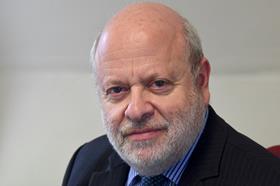Is there a phrase which describes the role of a lawyer truthfully and positively, and which can be used as shorthand in public discourse?

The currently accepted phrase is ‘professional gatekeeper’ (I will ignore the slur of ‘professional enabler’, which is intended to imply that we help our clients do whatever they want, even unlawful or unsavoury things).
If you look up professional gatekeepers in the UK, you are first directed to jobs as doorkeepers in hotels or security people on construction sites.
Yet it has gained a more distinct meaning, which we have begun to adopt: as an independent professional who is able to control access by clients to particular transactions in, say, the financial industry. In this sense, a lawyer is a gatekeeper to the client who might want to launder money, shutting the door in the client’s face if illegality is afoot.
But gates can usually open both ways, allowing people in and out, depending on the direction in which they are heading.
In this two-way context, a lawyer may be seen on the one hand as a gatekeeper facing the client on behalf of society to ensure that the client does not head in an unlawful, or maybe even an unfair or unjust, direction. But, on the other, the lawyer is also a gatekeeper on behalf of the client facing the outside world, to make sure that an overweening government or other public body does not have access to the client’s secrets. Often the lawyer may face both ways – but if both, to what or whom, or in which direction, does the lawyer owe a primary duty?
We know from the money-laundering legislation that the lawyer is supposed to be facing the client on behalf of the government’s best effort to tackle the problem. Lawyers have to report on their clients in certain circumstances, and not tip them off when doing so. Lawyers and bars in many countries have tried to persuade the authorities that that is not the way, or at least the chief way, that lawyers are supposed to face, but the authorities have not been persuaded.
But does that decide the direction of guarding in every case apart from AML?
The conundrum goes to the heart of our identity. Our critics call us professional enablers, and some want to insist in reply that we are professional gatekeepers. But that does not answer the question, either, because it does not settle the direction – how do we describe the two-way gate’s consequences?
If you need a current example of the importance of the outward-facing gatekeeper role, you need look no further than the ongoing scandal of surveillance spyware like Pegasus and Predator. This is highly sophisticated technology which can extract vast amounts of data from targeted mobile phones without the phone-owner being aware. It is hotting up again because it has only recently been revealed that a Greek opposition leader and a journalist were targeted, and there have been consequences at European level.
The in-depth analysis provided to the European Parliament in May of this year, ‘Pegasus and surveillance spyware’, makes clear that lawyers are targets. The first ever detection of the spyware was on a lawyer’s phone (an Arab lawyer), and the report cites spying on prominent lawyers in Poland and Hungary, and takes for granted in various statements scattered throughout the report that lawyers are obvious targets. Just last year it was revealed that two prominent family law solicitors in London were victims of such spyware during the divorce of the ruler of Dubai.
This is an example of lawyers being gatekeepers of their clients’ secrets, and shows the importance of the outward-facing role: lawyers must ensure that confidentiality is protected with the strongest possible legal and technological guarantees.
The search, therefore, continues for a snappy phrase to replace ‘professional enabler’ and even ‘professional gatekeeper’.
We know what we want to describe. A lawyer is a person who, before undertaking any transaction, considers a range of binding ethical principles, in our case the SRA Principles. If the principles conflict, the lawyer is bound to follow those which safeguard the wider public interest such as the rule of law and the administration of justice, which take precedence over an individual client's interests. It is not an easy exercise to know where the balance lies, and there are not always clear signposts. But the lawyer is bound to consider all the principles, and come to a reasoned and reasonable conclusion.
In other words, we are not looking at an enabler or a gatekeeper, but an ethical professional with a mix of responsibilities towards both the client and the wider administration of justice and the rule of law.
Does anyone have a marketable phrase of two words or so which covers such a professional, and which we can use in the future?
Jonathan Goldsmith is Law Society Council member for EU & international, chair of the Law Society’s Policy & Regulatory Affairs Committee and a member of its board. All views expressed are personal and are not made in his capacity as a Law Society Council member, nor on behalf of the Law Society
This article is now closed for comment.































7 Readers' comments